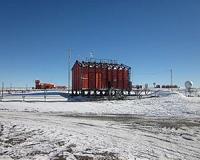 |
Washington (AFP) May 24, 2011 NASA said Tuesday that a new spacecraft to ferry humans into deep space will be based on designs for the Orion crew exploration vehicle and built by Lockheed Martin. The Orion capsule, originally designed to take astronauts back to the moon, is a surviving component of the Constellation manned space exploration program canceled by President Barack Obama last year for being behind schedule and over budget. NASA administrator Charles Bolden said the designs for Orion would be used to forge ahead with a new spacecraft known as the Multi-Purpose Crew Vehicle (MPCV), which would lift off atop a massive rocket and someday take explorers to an asteroid and Mars. "We are committed to human exploration beyond low-Earth orbit and look forward to developing the next generation of systems to take us there," Bolden said in a statement. He said Congress's NASA Authorization Act "lays out a clear path forward for us by handing off transportation to the International Space Station to our private sector partners, so we can focus on deep space exploration. "As we aggressively continue our work on a heavy lift launch vehicle, we are moving forward with an existing contract to keep development of our new crew vehicle on track." Lockheed Martin Corporation is to continue its work on building the space capsule -- begun in 2006 -- which aims to carry four astronauts at a time on 21-day missions into deep space. The capsule will weigh 23 tons and NASA has no date set for a potential launch, said Douglas Cooke, associate administrator for NASA's exploration systems mission directorate. There is also no final cost associated with the project. "We are still working on our integrated architecture, and that includes the space launch system along with ground systems and other supporting projects," said Cooke. "At this point we do not have a specific date," he said. "In terms of deep space exploration we hope to have test flights obviously in this decade. We are not exactly sure when but obviously as early as possible." With the space shuttle program ending this year, NASA is working with private companies on a separate effort to build a new spacecraft to replace the shuttle and transport astronauts and cargo to the orbiting International Space Station. When the shuttles become museum pieces, US astronauts will hitch rides on Russian spacecraft to orbiting station until a replacement is developed. SpaceX successfully tested its Dragon capsule last year on the first ever flight into orbit and back by an unmanned commercial spacecraft. Several companies are competing to be the first to have a new crew space vehicle ready for low Earth orbit by 2015. Unlike the space shuttle, the MPCV is designed to be "10 times safer during ascent and entry," NASA said. "The Orion government and industry team has shown exceptional creativity in finding ways to keep costs down through management techniques, technical solutions and innovation," Cooke said.
Share This Article With Planet Earth
Related Links Space Tourism, Space Transport and Space Exploration News
 Testing Spacesuits in Antarctica - Part 1
Testing Spacesuits in Antarctica - Part 1Moffett Field CA (SPX) May 24, 2011 Once you've been to Antarctica, you just really want to go back. There is a sign in the lunch room here at Marambio base, that says (with poetic license thanks to Pablo): "When you arrived you barely knew me; when you leave you'll take a part of me with you." There is something about Antarctica that always stays with you and beckons you back. So how could I possibly say no to going down to ... read more |
|
| The content herein, unless otherwise known to be public domain, are Copyright 1995-2010 - SpaceDaily. AFP and UPI Wire Stories are copyright Agence France-Presse and United Press International. ESA Portal Reports are copyright European Space Agency. All NASA sourced material is public domain. Additional copyrights may apply in whole or part to other bona fide parties. Advertising does not imply endorsement,agreement or approval of any opinions, statements or information provided by SpaceDaily on any Web page published or hosted by SpaceDaily. Privacy Statement |